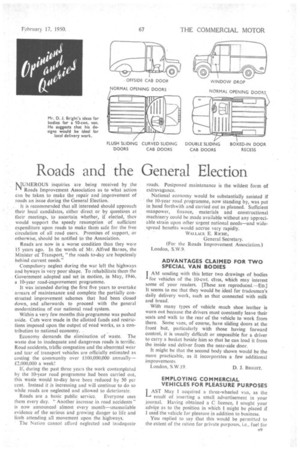Roads and the General Election
Page 43

If you've noticed an error in this article please click here to report it so we can fix it.
• NUMEROUS inquiries are being received by the " Roads Improvement Association as to what action can be taken to make the repair and improvement of roads an issue during the General Election.
It is recommended that all interested should approach their local candidates, either direct or by questions at their meetings, to ascertain whether, if elected, they would support the speedy resumption of sufficient• expenditure upon roads to make them safe for the free circulation of all road users. Promises of support, or otherwise, should be notified to the Association.
Roads are now in a worse condition than they were 15 years ago. In the words of Mr. Alfred Barnes, the Minister of Transport, "the roads to-day are hopelessly behind current needs."
Compulsory neglect during the war left the highways and byways in very poor shape. To rehabilitate them the Government adopted and set in motion, in May, 1946, a 10-year road-improvement programme.
It was intended during the first five years to overtake arrears of maintenance and complete the partially constructed improvement schemes that had been closed down, and afterwards to proceed with the general modernization of our national road system.
Within a very few months this programme was pushed aside. Cuts were made in the allotted funds and restrictions imposed upon the output of road works, as a contribution to national economy. .
Economy demands the elimination of waste. The waste due to inadequate and dangerous roads is terrific. Road accidents, traffic congestion and the abnormal wear and tear of transport vehicles are officially estimated as costing the community over £100,000,000 annually— L2.000,000 a week!
lf, during the past three years the work contemplated by the 10-year road programme had been carried out, this waste would to-day have been reduced by 50 per cent. Instead it is increasing and will continue to do so while roads are neglected and allowed to deteriorate.
Roads are a basic public service. Everyone uses them every day. Another increase in road accidents" is now announced almost every month—unassailable evidence of the serious and growing danger to life and limb attending all movement upon the highways.
The Nation cannot afford neglected and inadequate roads. Postponed maintenance is the wildest form of extravagance.
National economy would be substantially assisted if the 10-year road programme, now standing by, was put in hand forthwith and carried out as planned. Sufficient manpower, finance, materials and constructional machinery could be made available without any 'appreciable strain upon other urgent national needs—and widespread benefits would accrue very rapidly.
WALLACE E. RICHE,
General Secretary.
(For the Roads Improvement Association.) London, S.W.9.




























































































